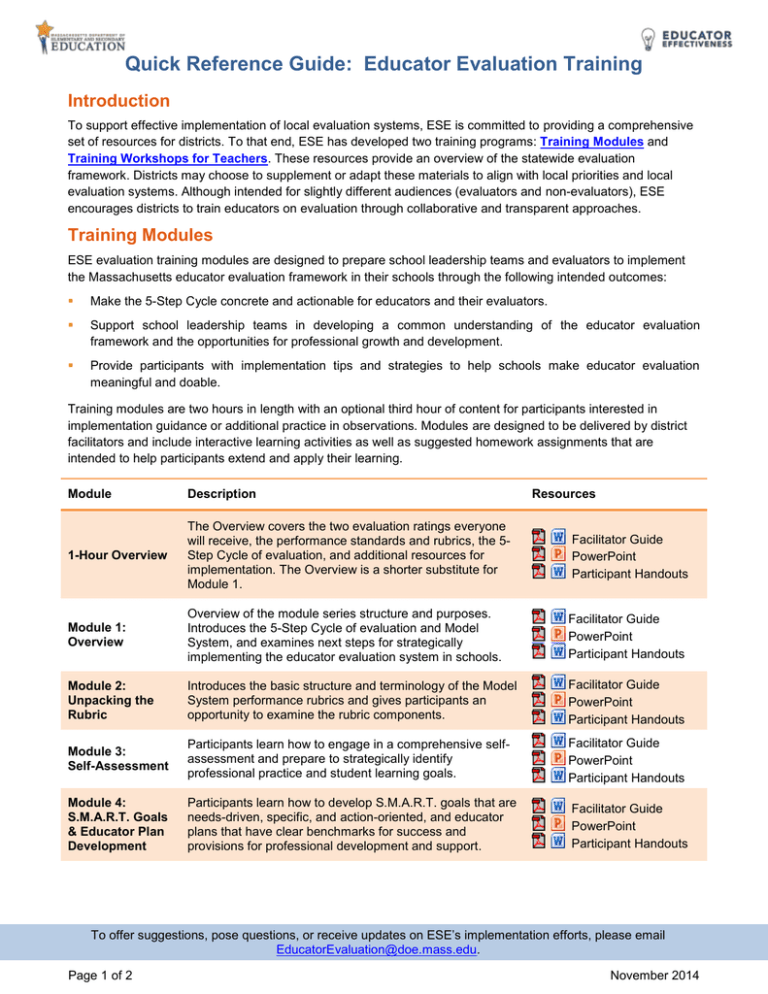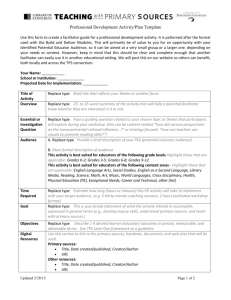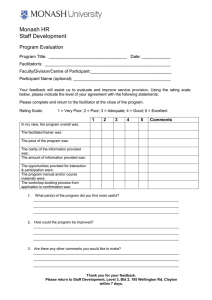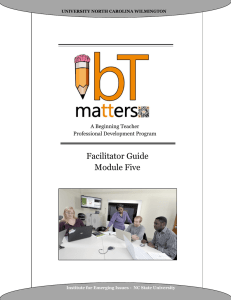QRG TrainingReqs
advertisement

Quick Reference Guide: Educator Evaluation Training Introduction To support effective implementation of local evaluation systems, ESE is committed to providing a comprehensive set of resources for districts. To that end, ESE has developed two training programs: Training Modules and Training Workshops for Teachers. These resources provide an overview of the statewide evaluation framework. Districts may choose to supplement or adapt these materials to align with local priorities and local evaluation systems. Although intended for slightly different audiences (evaluators and non-evaluators), ESE encourages districts to train educators on evaluation through collaborative and transparent approaches. Training Modules ESE evaluation training modules are designed to prepare school leadership teams and evaluators to implement the Massachusetts educator evaluation framework in their schools through the following intended outcomes: Make the 5-Step Cycle concrete and actionable for educators and their evaluators. Support school leadership teams in developing a common understanding of the educator evaluation framework and the opportunities for professional growth and development. Provide participants with implementation tips and strategies to help schools make educator evaluation meaningful and doable. Training modules are two hours in length with an optional third hour of content for participants interested in implementation guidance or additional practice in observations. Modules are designed to be delivered by district facilitators and include interactive learning activities as well as suggested homework assignments that are intended to help participants extend and apply their learning. Module Description Resources 1-Hour Overview The Overview covers the two evaluation ratings everyone will receive, the performance standards and rubrics, the 5Step Cycle of evaluation, and additional resources for implementation. The Overview is a shorter substitute for Module 1. Facilitator Guide PowerPoint Participant Handouts Module 1: Overview Overview of the module series structure and purposes. Introduces the 5-Step Cycle of evaluation and Model System, and examines next steps for strategically implementing the educator evaluation system in schools. Facilitator Guide PowerPoint Participant Handouts Module 2: Unpacking the Rubric Introduces the basic structure and terminology of the Model System performance rubrics and gives participants an opportunity to examine the rubric components. Facilitator Guide PowerPoint Participant Handouts Module 3: Self-Assessment Participants learn how to engage in a comprehensive selfassessment and prepare to strategically identify professional practice and student learning goals. Facilitator Guide PowerPoint Participant Handouts Module 4: S.M.A.R.T. Goals & Educator Plan Development Participants learn how to develop S.M.A.R.T. goals that are needs-driven, specific, and action-oriented, and educator plans that have clear benchmarks for success and provisions for professional development and support. Facilitator Guide PowerPoint Participant Handouts To offer suggestions, pose questions, or receive updates on ESE’s implementation efforts, please email EducatorEvaluation@doe.mass.edu. Page 1 of 2 November 2014 Quick Reference Guide: Educator Evaluation Training Module 5: Gathering Evidence Participants focus on the collection and organization of evidence by Standard and Indicator and the strategic identification of high-quality artifacts. Facilitator Guide PowerPoint Participant Handouts Module 6: Observations & Feedback Participants learn about observations (both inside and outside of classrooms), the collection and organization of observation evidence, as well as the sharing of timely, constructive feedback to educators. Facilitator Guide PowerPoint Participant Handouts Training Workshops for Teachers & SISP Educators (non-evaluators) The training workshops include an orientation and four workshop sessions designed to prepare teachers and other educators to be active participants in their evaluation. Workshops were developed in partnership with Massachusetts teachers. Districts (through their schools) can use a variety of settings to deliver these workshops, each of which is designed to be led by a department head or grade/team lead in a small group setting, such as common planning time. Workshop Description Resources Orientation Orientation reviews the purpose of the evaluation framework, the two ratings everyone will receive, the 5-Step Cycle of evaluation, and key characteristics of the performance rubric. Facilitator Guide Workshop 1: Rubric Review Educators learn about the Standards and Indicators on the performance rubric, as well as the evaluation ratings (Unsatisfactory to Exemplary). Facilitator Guide Workshop 2: Self-Assessment Participants receive the time, information, and resources they need to complete Step 1 of the 5-Step Cycle: selfassessment and create their own self-assessments using relevant rubrics, models, and student data. Workshop 3: S.M.A.R.T. Goals Participants receive the time, information, and resources they need to identify their student learning and professional practice goals and learn about the link between S.M.A.R.T. goals and the creation of an educator plan. Workshop 4: Gathering Evidence Participants learn about the three types of evidence required in an evaluation and receive tips and strategies for determining high quality artifacts of practice and measures of student learning. PowerPoint Participant Handouts Facilitator Guide Participant Handouts Facilitator Guide Participant Handouts Facilitator Guide Participant Handouts FAQ’s 1. If educators in my district receive training on the modules, do they have to go through the workshops as well? No. Teachers and other non-evaluators who are trained using the modules would not have to do the workshops. However, the training workshops are designed to facilitate the completion of specific components of the 5-step cycle and may be of use to educators who have already completed the modules. 2. Do educators need to repeat the training modules and/or workshops every year? Not necessarily. However, each district should take care to provide evaluators and educators with appropriate training to ensure that the evaluation process is efficient and meaningful. To offer suggestions, pose questions, or receive updates on ESE’s implementation efforts, please email EducatorEvaluation@doe.mass.edu. Page 2 of 2 November 2014




